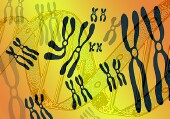ERCC1 C118T genotype may identify good prognosis in subgroup of pEBV-negative patients
THURSDAY, Aug. 27, 2015 (HealthDay News) — Excision repair cross-complementing group 1 (ERCC1) genotype for the single nucleotide polymorphism (SNP) cytosine-to-thymine substitution at codon 118 (C118T) interacts with post-radiotherapy plasma Epstein-Barr virus (EBV) DNA (pEBV) to identify favorable prognosis for a subgroup of patients with nasopharyngeal carcinoma (NPC), according to a study published in the Aug. 15 issue of Cancer.
Edwin P. Hui, M.D., from The Chinese University of Hong Kong, and colleagues examined whether the ERCC1 genotype for the SNPs C118T and cytosine-to-adenine substitution at codon 8092 (C8092A) is prognostic in patients with NPC. The authors evaluated the hypothesis using biomarker screening samples from a prospective, multicenter trial that used post-radiotherapy pEBV levels to screen high-risk NPC patients for adjuvant chemotherapy. ERCC1 SNPs were analyzed in 576 patients who underwent pEBV screening.
The researchers found that neither ERCC1 C118T nor C8092A genotype correlated with relapse-free survival (RFS) or overall survival (OS). In multivariate analyses, only post-radiotherapy pEBV status independently predicted RFS and OS. A significant interaction was seen for ERCC1 C118T genotype and pEBV status (RFS, P = 0.0106; OS, P = 0.0067). In the pEBV-negative, but not pEBV-positive, population, ERCC1 C118T genotype correlated with both RFS and OS (hazard ratios, 1.67 and 2.31, respectively).
“The ERCC1 C118T genotype may help to identify a favorable subgroup (approximately 7 percent) of pEBV-negative patients with NPC who have an excellent prognosis and can be spared the toxicities of further therapy,” the authors write.
One author disclosed financial ties to the pharmaceutical industry.
Copyright © 2015 HealthDay. All rights reserved.








